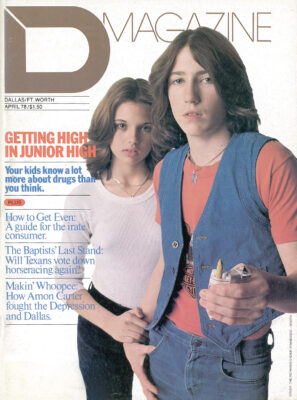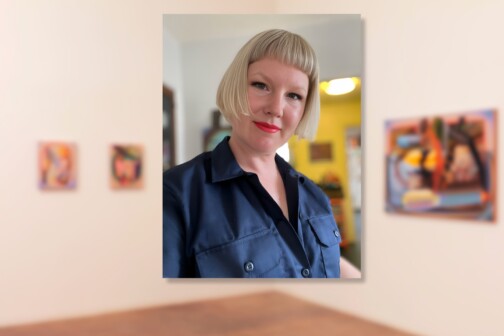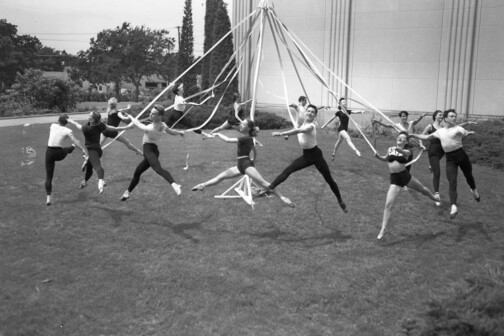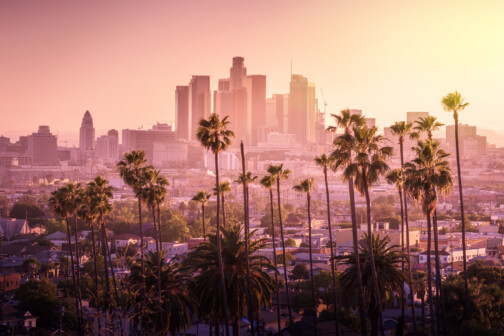The Reverend W. A. Criswell stroked his steelypompadour with one hand and brought the otherto the desk top with a resounding smack. “I’ll diefighting immorality like prostitution and drugs.And gambling is absolutely the same thing.
“I presume they are gamblers. Who else would push for gambling in our state beside gamblers? I just pray for some awakening in our people that would make state-sponsored gambling unthinkable.”
As perhaps the most powerful Baptist pas-tor in the nation, W. A. Criswell of Dallas’ First Baptist Church is accustomed to conjuring moral indignation on a variety of subjects and as frequently as it is called for. Fire and brimstone Christian outrage is as much a part of his persona as his wavy gray mane and his perpetually clenched jaw. But in this case, Criswell’s fervor seems to extend well beyond the pulpit. The subject at hand is not some moral abstraction, but a hard political reality: legalized, state-regulated pari-mutuel betting on horse racing in Texas.
Fifteen times since 1937, Criswell’s prayers have been answered: Texans have rejected state-sanctioned horse race wagering as a matter of habit, though by diminishing margins. Only once, for a five-year interlude in the 1930’s, did the state allow pari-mutuel betting – and then only under the extreme economic hardship of the Great Depression. The Baptists have managed to control past elections through seemingly limitless campaign funds and an array of arguments taken from dozens of Biblical parables.
But those arguments are beginning to sound more strident these days, primarily because for the first time in 40 years, the Baptists may be defeated in their moral crusade. Horse racing proponents have gathered enough signatures on petitions to mandate another statewide referendum in both party primaries this May. Should it pass, horse racing advocates will have all the political ammunition they need to pressure the legislature into sanctioning local option elections on the issue. And all indications are that pari-mutuel proponents at last have the numbers to bring legalized horse race betting to Texas.
To wit: In the 1962 referendum, anti-gambling forces snuffed the measure by a solid 55 to 45 percent margin: by 1974, however, they could only muster 52 percent of the vote – a meager 24, 000 votes statewide. More important, in a poll conducted last December by Louisiana-based Kennedy and Associates 635 of the 950 Texans polled agreed that pari-mutuel betting should be a matter of local option. Even spokesmen for the Baptist General Convention concede that the coming local-option referendum will be extremely close.
No wonder Criswell is already sermonizing with fervor. Losing the pari-mutuel battle represents more than political defeat; in many ways, it could spell the end of the Baptists’ moral preeminence in Texas. Loss of the liquor-by-the-drink question in the early Seventies was a staggering blow; this spring’s pari-mutuel fight could provide the knockout punch.
Once again, the issue will polarize along urban-rural lines. The anti-gambling forces, led by the Baptist General Convention and law enforcement agencies, will draw the largest measure of their support from the state’s rural areas and medium-sized cities such as Lubbock, Abilene and Waco. The proponents will find their constituency in Dallas, Houston and San Antonio. And each group will launch its campaign through a gaudily named front organization – the anti’s through the Anti-Crime Council, formed in 1974, the pro’s through People for Popular Sports, organized the same year.
Each organization will try to augment its emotional arguments with big name supporters: The People for Popular Sports bring up Humble Oil heir W. S. Parish, Charles Hancock, former president of American Petrofina, and San Antonio oilman Arthur Seeligson, Jr., whose horse Avatar won Belmont in 1975. The Anti-Crime Council will counter with Carol Vance, former Houston DA, Mrs. Homer Garrison, widow of the former Department of Public Safety head, Dallas attorney Forrest Smith and Baylor University President Abner McCall.
In the next round of debate, the pro forces will undoubtedly stress money arguments. “We’re just being foolish, ” Tom Russell, secretary-treasurer of the Thoroughbred Breeders Association, drawls as he trudges along a pasture in his back forty in Red Oak. “We’re lettin’ the other states around us siphon off our people and our money. We’re turning our back on a major industry, which would employ thousands of Texans and attract thousands more to our state. All of that means money. Cash for roads and schools and services. “
The statement that large numbers of Texans leave the state to pursue horse racing is indisputable. Thirty-two of the 48 continental states have pari-mutuel wagering, including four of the five states that share borders with Texas. Those four states have 11 racetracks, nine of which are lying like financial leeches within 100 miles of the Texas border.
Estimates on how much money Texans annually spend on horse racing in other states start at $50 million and head upward. In fact, state representative Matt Garcia, who sponsored the 1977 horse racing bill, proposed calling the bill the “Texas Revenue Recovery Act. “
The heaviest Texas support goes to Louisiana Downs in Shreveport and Oaklawn Park in Hot Springs, Arkansas. Neither will release figures on the actual amount of Texas betting, but neither recoils at estimates of 50 percent or more. In an informal survey of the Louisiana Downs parking lot one day last year, two thirds of the cars had Texas plates; fewer than a fourth came from Louisiana.
In 1976, Oaklawn’s total handle (that is, monies wagered for its 50-day meeting) was just over $96 million. Louisiana Downs’ total neared $56 million. Applying the 50 percent figure means that in 1976, Texans bet $76 million at those tracks. Tracks return about 85 percent of all monies wagered to the bettors and split the rest among purses for the race, the track and state tax. Thus Texans left approximately $7. 2 million at Oaklawn, and $4. 2 million at Louisiana Downs.
Tracks a little closer to home would draw even more Texans ready to gamble. Data gathered by a state senate committee in 1972 show that on the average, a state with pari-mutuel betting has a yearly track attendance equal to about 40 percent of its population, so Texas tracks could expect six million horse players per year. The average bettor wagers $82 in a day at the races, and gets back $69. 70. (These are national averages; Texans, with a history of highrolling, are likely to bet more. ) The remaining $12. 30 per bettor is divided among the track, horse owners, and the state, with the state taking a third to a half. At five million players per year, the total handle would be $410 million, and the state’s cut $20 to $35 million.
Opponents of betting argue that the state’s share of the betting handle would be an insignificant contribution to the state budget – an estimated $30 million compared to $17 billion. The state’s share would be diminished by the cost of collecting it and policing the track. Gambling alone won’t stave off the need for an income tax.
Any mention of how pari-mutuel wagering tracks might create jobs and thus benefit the poor is tantamount to waving a red flag in front of the anti forces. Phil Strickland, associate director of the Christian Life Commission of the Baptist General Convention, says, “Pari-mutuel wagering victimizes the poor. The only real long-run winners at the track are the people who control it and those who know something. We have various studies, all of which indicate that racetrack gambling is a dream to dangle in front of the poor, just like lotteries and other forms of gambling. But how many ever realize that dream?”
Rev. Criswell adds: “Money spent at the track is all too often money that should be spent for the light bill, groceries, baby shoes, rent. The only winners in gambling are the people who run the game. “
Criminals will eventually run the game, says the Anti-Crime Council. Reports of scandals at major tracks add fuel to their arguments. Says Allan Maley, “The horse racing people claim that legal gambling keeps illegal gambling out. But bookies thrive on legal racing. They’ll take business away from the betting window because they take a smaller cut. They give credit, and you can place your bet over the telephone. Organized crime comes in to operate clearing-houses for the bookies to lay off their bets. “
“That’s hogwash, ” answers Tom Russell of the Thoroughbred Breeders Association. “We have affidavits also. Horse racing polices itself better than any other sport. And as for bookmaking, there are millions bet illegally in Texas every autumn weekend on football games. Bookies are already in Texas. ” He adds, “I thought we had separation of church and state in Texas, but that apparently isn’t true. Most horsemen are church-going men and I resent the implication that I’m a gambler. If the Mafia’s behind me why am I selling bumper stickers for fifty cents to raise money for the campaign?”
However, Ed Joyce, 18-year veteran of the Justice Department and expert on organized crime, says, “In 1972, Operation Anvil, which was a nationwide analysis of wiretaps and gambling records by the FBI, disclosed that the crime rate in areas having legalized gambling was approximately three times higher than in areas which did not allow it. The primary increase of criminal involvement was, of course, in bookmaking; but we found that approximately 45 percent of that bookmaking involved organized crime, and thus those areas also experienced a rise in prostitution, narcotics trafficking, and loan sharking. It appears that when the bars are let down, people feel that there is no longer a societal objection to betting, and thus all kinds of gambling rise markedly. “
In spite of the FBI’s statistics, Shreve-port police have noted no marked increase in crime during the four years since Louisiana Downs opened. “We’ve not found any of the prophecies to be true, ” reports chief of police Kenneth Lanigan. But the track does admit having barred well over a hundred people who were suspected of illegal activity.
Horsemen counter crime talk by saying they don’t want off-track betting and gimmick wagering, like exactas and trifectas, which have been the source of several “fixes” at other tracks. They propose that tracks be run by non-profit foundations, with revenues to go to the state and to charities.
The opponents of pari-mutuel wagering in Texas get support from some out-of-state racetrack managers, who might be suspected of attempting to keep their Texas customers. Vince Bartimo, general manager of Louisiana Downs, says, “In the short run it does generate revenues. But in the long run any form of legalized gambling can become the worst kind of cancer you can inflict on an area. “
Such statements from racing professionals annoy horsemen. But what infuriates them is rumors of money being poured into Texas by out-of-state tracks to defeat the pari-mutuel movement. Estimates of how much money is passed to lobbyists vary. TTBA President Elkins has some personal guesses. “Those tracks in Louisiana and the one in Arkansas could have funnelled $300, 000 or more to Austin law firms to fight our bill last session. ” All the tracks deny the rumors.
Money, not rhetoric, may decide the outcome of the referendum. In 1974, the People for Popular Sports and the Anti-Crime Council of Texas spent nearly a half-million dollars. According to the Secretary of State’s records, the PFPS dished out $325, 797. 72 in a losing effort. The ACT spent $127, 574. 59.
The pro forces received contributions ranging from a few dollars to the $2, 500 from Nelson Bunker Hunt. More money came from loans, some of which reached large proportions, like the $25, 000 from current THA board member W. S. Farish. The money went for lobbyists, advertising costs and administrative expenses. For the coming campaign, the horse racers plan to spend $200, 000-$00, 000. But, according to Doug McCreary, they mean to get a clear mandate this time, and they’re willing to spend a half-million dollars if necessary to counter a last-minute Baptist advertising drive.
The opposition also attracted contributions. But Texas law forbids religious organizations from contributing to a candidate or political group. So the Anti-Crime Council printed thousands of pamphlets and information packets and sold them to church groups as “printed educational materials. ” Sales ranged from $3 (Floyd Methodist Church in Greenville) to $5, 000 (North Texas Conference of the United Methodist Church). But the real whopper on the list is a $60, 000 purchase by the Baptist General Convention on April 22, 1974, 12 days before the May 4th primary election. The ACT lists another $12, 000 purchase by the BGC on May 7, 1974.
The ACT used the money in a media saturation campaign, buying space in 60 Texas newspapers and time on 116 Texas radio stations during the seven days before the election.
Baptist General Convention spokesman Phil Strickland says lawyers checked the election code and found that the purchase of such materials, with monies contributed to the convention by member churches, is not in violation of the law. But the horse racers are not convinced of that.
TTBA secretary Russell presented the possibility of violation to the law firm of O’Rourke and Lawler, which studied the case and replied: “On the face of the reports, there appears to be a substantial violation of the Texas Election Code by the Baptist General Convention of Texas and the Anti-Crime Council… it appears that the Baptist General Convention of Texas had done indirectly what it cannot do directly – spend tax-exempt, non-profit funds to influence the outcome of the election . . . . “
No suit resulted from the inquiry, possibly because the firm estimated it would cost $l0, 000-$20, 000. Possibly also because even some of the pro forces admit it would have been extremely difficult to pin a legal violation on the BGC.
Should the referendum succeed, the future of Texas horse racing rests with the legislature. The Texas Horseracing Association spent $115, 000 trying to get a bill to the floor last session. It died in committee, leading one wag to spout that “for that kind of money you should be able to get almost anything to the floor. “
The bill died in committee because the legislators wanted it dead – legislators on both sides. For if it had come to a vote, the congressmen’s allegiances would have been identified. Some of the pro-pari-mutuel legislators especially fear such circumstances, because they would then be subject to the “Baptist backlash. ” “It’s very real, ” Anti-Crime Council president McCall says. “Those politicians will feel the effect of the grudge vote by the anti forces. ” The THA hopes to overcome politicians’ fears of angry Baptists by garnering enough votes in the referendum to force state house leadership to send the bill to a committee that will report it out. (For survey of Dallas and Fort Worth legislators’ stands on the issue, see sidebar, p. 113).
After evaluating all the arguments about economics and organized crime, the voters may still make an emotional decision. The Baptists are banking on that. As Reverend Criswell says, “Gambling is an attempt to get something for nothing, and that attempt God says is wrong… Anything that concerns the moral life of the people ought to be a message from God through His preachers in the pulpit… Gambling is immoral.”
Where Will the Horses Run?
Baptists and gamblers agree that if pari-mutuel betting comes to Texas, there will be a major track serving Dallas and Fort Worth. According to Charles Hancock of the Texas Horseracing Association, a Dallas track could draw several million fans a season. That kind of attraction is bound to boost the value of nearby land, so now’s the time for speculators to stake out claims.
The first step in building a track will be to find a county that will accept it. The referendum calls for the legislature to give each county the option of legalizing betting; maybe neither Dallas nor Tarrant County will go for horse racing in a local option election. Fort Worth was the only major city to vote against betting in 1974, and even if W. A. Criswell can’t keep gambling out of his state, he may be able to keep it out of his county.
But considering the money a track would surely bring to its host community, it’s a safe bet that there’ll be one within a hundred miles of Dallas. A few likely locations:
Fort Worth’s Great Southwest International Airport was less than a resounding success as an aviation center, but it might fly as a racetrack. The last commercial flight left in 1965; since then it has seen occasional automobile and motorcycle racing. The Fort Worth city manager’s office is desperate to get the property onto the tax rolls, and the last offer they entertained for the 1200 acres was $20 million. The city would rather sell the entire parcel than break it up into lots. Only 400 acres are needed for a track, but a promoter of vision might see the remaining 800 acres holding air terminals for horse transport, breeding farms, housing for track employees, and perhaps a theme park. The location has a lot going for it: plenty of space, good highway access, airport facilities – and it’s in wet Fort Worth.
Perhaps the ideal spot is the ten-mile-long amusement arcade on the Dallas-Fort Worth Turnpike, handy to both cities. It’d be hard to put together 400 acres near Arlington, but a track might share parking facilities with Six Flags or Ranger Stadium. Perhaps the tanks at the now-defunct Seven Seas can be converted to horse troughs.
There’s plenty of undeveloped land zoned for industry north of Arlington on Highway 360. It’s just a few miles south of DFW airport, and nearly equidistant from Dallas and Fort Worth. Moving east into Dallas County, there’s land ripe for development along Highway 356 – but much of western Dallas County prohibits liquor sales. which would put a dent in the concession stand receipts.
Many horse racing advocates are intrigued by the notion that the city of Dallas could operate a track almost downtown, at Love Field. But the city government hasn’t entertained the idea. Assistant City Manager Camille Cates says, ’”To build a track at Love Field you’d have to shut down a successful general aviation center and pull up a lot of concrete. The city has no immediate or long-range plans to close it down. “
If the legislature approves of pari-mutuel betting at local option, some hitherto anti-gambling rural communities near Dallas will be taking a hard look at the economic benefits of playing host to gamblers. Such considerations can override a lot of moral scruples, so in a few years the list of major U. S. horse races could include the Preakness, the Kentucky Derby, and the Waxa-hachie Stakes.
How the Legislators Will Vote
If the May referendum passes, it will encourage the legislature to send the horse racing question back to the individual Texas counties, for local option elections. However, such a bill was introduced last legislative session and it died in committee – according to Representative John Bryant, as a result of some artful fence-sitting, especially by Speaker Billy Clayton. “Clayton told the horse people he was for it and told the Baptists he was against it. Then he assigned it to a committee that doomed the bill. “
This time may be different. Senator Ike Harris of Dallas says a clear majority for horse racing in the coming referendum will force the house leadership to get a bill out on the floor for a vote. If it comes to that, it will be the north versus the south – the same division seen in the debate over liquor by the drink. In 1969, the split prompted the late Senator V. E. “Red” Berry to propose that Texas divide into two sovereign states so the south could go to the races.
We called most of the legislators from Dallas and Fort Worth to ask if they would support a bill to legalize pari-mu-tuel betting under state regulation at the option of each county. Five favored such a bill: Ike Harris, Ron Clower, Frank Gaston. Paul Ragsdale, and Oscar Mauzy. David Cain, John Bryant, and Anita Hill were opposed to it. Some dozen legislators wanted to wait and see referendum results or polls from their districts, or examine a bill in detail, before taking a stand.
Ike Harris, a long-time supporter of legalized betting, stresses the economic argument. “I enjoy horse racing, and a wager adds to the excitement of the race. My main reason for supporting pari-mutuel betting is economic: It’ll be a brand new industry for the state. It can be well run – gambling doesn’t have to be dirty. ” Carlyle Smith sees economics as the only justification: “I would support a bill only when economics mandated it. If the state were faced with a decision between horse racing and an income tax, I’d support horse racing. It’s an economic last resort. “
Chris Miller speaks for those waiting to learn constituents’ opinions. “It’s going to depend on the way the referendum goes in my district. I have no strong opinion about gambling: I’ve always felt that Wall Street was one of the biggest gambles around. But on the other hand I see no necessity for racetrack betting. I’ll just wait and see how the people in my district feel about it. “
Some legislators have decided that the risks of gambling outweigh any possible benefits. Says John Bryant. “County option is kind of a fraud. Because there would only be three tracks in the state (Dallas. Houston, and San Antonio), county option in no way limits the impact of racetrack betting. Those who think betting will generate a lot of revenue are fooling themselves. Looking at the figures for New York I was surprised at how little money betting brought to the state treasury. Twenty million a year is just a drop in the bucket for the Texas budget, and it’s just not worth the problems gambling would generate. ” For Anita Hill, it remains a question of right and wrong, and economics don’t apply. “I disapprove of gambling on religious and moral grounds. If the referendum passed by 90 percent I still wouldn’t support it. “





